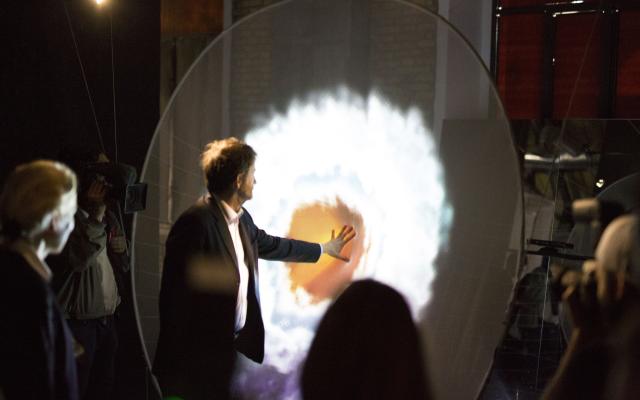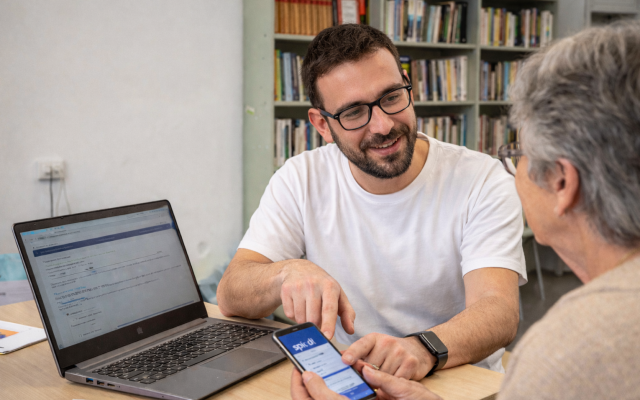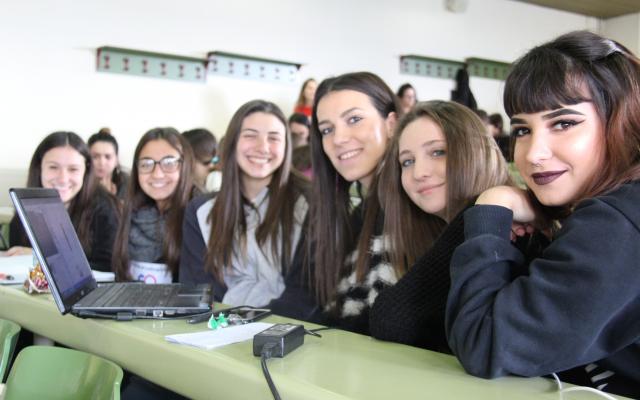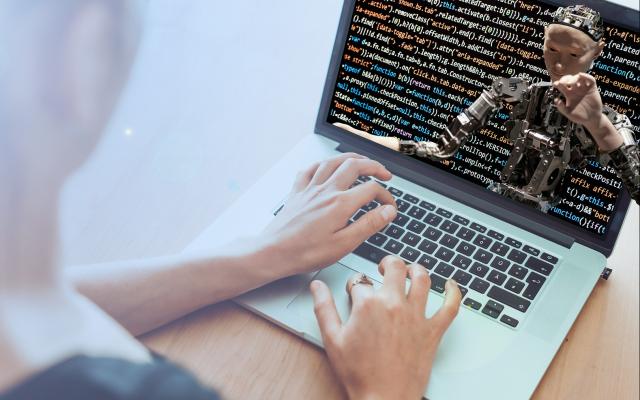A day dedicated to the second edition of the national award
We at Fondazione Mondo Digitale also feel like winners of the National Award for Digital Skills, an initiative of Repubblica Digitale promoted by the Department for Digital Transformation of the Presidency of the Council of Ministers and implemented with the support of Invitalia. Among the winners of the second edition, on 22 October, was the LEADersinSTEM project, an initiative of the Department of Computer Science at the University of Salerno, of which we are a strategic partner. The award for the category “Digital against the gender gap” was collected by Delfina Malandrino, associate professor and guidance counsellor.
The project takes up the challenge of Coding Girls, integrating job shadowing activities with local companies that offer immersive and practical experiences to consolidate skills, promote learning in the field and offer a concrete vision of technological applications in the professional sphere, while contributing to raising awareness of professional opportunities.
Two other projects by the Foundation reached the final: Pathway Companion, the platform with intelligent tutoring for special needs, in the “Digital Inclusion” category, and Ital.IA Lab, a training laboratory on the potential of artificial intelligence, in the “Specialist ICT Skills” category. Selected by specialist juries for each category, they were voted on by citizens on the Repubblica Digitale portal. The awards were presented by representatives of the jury, including: Caterina Vignato from Agit, Tiziana Catarci from the Department of Computer, Control and Management Engineering at Sapienza University, Natalia Amorelli from MIM, and Marco Valerio Cervellini from the National Cybersecurity Agency.
Onelia Onorati, press office of the Fondazione Mondo Digitale, participated in the afternoon workshop “Education and Higher Education”, chaired by Natalia Morelli. At the end, Nadia Dalla Costa, coordinator of Save the Children's Educational and Digital School Programme, summarised the reflections that emerged. "On the subject of the application of the MIM guidelines on AI in schools, all participants noted the need for clear governance and continuous training for teachers, with the collaboration of local authorities. The need for continuous monitoring of the use of AI in classrooms emerged, but also the critical issue of the lack, in some cases, of a systemic and organic vision of the digital curriculum in Italian schools. Proposals included the use of e-Policies to integrate AI protocols, structured and continuous training for teachers, the sharing of use cases and decision-making processes, support for managers in the use of extracurricular spaces, and the creation of a national AI," he summarised. Among the points for discussion by the future working group are: an experimental space for AI in schools linked to university experiences, the involvement of fab labs and educational foundations, the dissemination of Steam and reverse mentoring experiences, i.e. intergenerational workshop activities based on coopetition and creative learning, and a review of civic education to integrate engaging and dynamic activities.
Among the reflections that emerged during the National Coalition Assembly in the morning, we would like to mention that of Guido Scorza, Member of the Italian Data Protection Authority: "Forty-six per cent of Europeans can be considered digitally illiterate, and in a democracy it is not possible for the benefits of AI to exclude more than half of the population! The first challenge is to ensure that opportunities are available to everyone, the second challenge is to be aware of the dangers associated with AI when used by people who are unfamiliar with the subject. We should abolish the expression “digital native” because it reinforces the belief that the role of adults is subordinate to that of young people, who are convinced that they already have all the necessary skills. Children and young people are a fragile link in the system because they are exposed to technology without being fully aware of the consequences. There are 14-year-olds who create videos with AI and ruin the lives of their peers. It's like getting on an electric scooter without knowing how to ride it.
Following the comments by Giuseppe Iacono, coordinator of the Repubblica Digitale initiative, on the main findings of the Strategy Operational Plan Monitoring Report, it was the turn of the various administrations to talk about their contribution to overall technological development.
Davide D'Amico, Directorate-General for Digital Innovation, Simplification and Statistics at the MIM: ‘We were the first in Europe to produce guidelines for the use of AI in schools, to build trust by highlighting the critical issues and opportunities of the tool. We launched the What's Next guidance initiative with the metaverse, a cybersecurity awareness campaign, AI solutions for schools to verify the results of experiments and build use cases.’ Luigi Pievani, General Secretariat of the MUR, highlighted how scholarships for female students are increasing and how female enrolment is growing.
Sauro Angeletti, Administrative Innovation Office of the DFP, urged public administration staff to consider training as a personal goal, highlighting how AI literacy has become a basic digital skill according to a ministerial directive of January 2025. ‘Today there is a new tool: the Syllabus platform with 50 courses and 70 hours of training. Nearly 400,000 employees have started at least one course on digital skills, while 82,000 are studying AI and 160,000 are training to introduce artificial intelligence into the public administration!’
Alessandro Soderini, Department for Digital, Connectivity and New Technologies MIMIT, mentioned the innovation manager voucher, which involves 3,000 companies worth €230 million, and support for training through the Digital Republic Fund, which involved 13,000 people in 2024, worth €63 million. Thirty-four million has already been committed to 73 projects dedicated to women, inactive young people, the unemployed and workers at risk of replacement. Andrea Piscopo, Directorate-General for Innovation and Digital Organisation, Statistics and Research MLPS: "The AI observatory at the Ministry of Labour is monitoring that the spread of AI puts people at the centre and does not produce bias. We are attentive to active policies for the reskilling of workers excluded from the world of work. Our ecosystem includes SIISL (a digital platform that connects citizens and businesses), AppLI (a virtual assistant to promote inclusion and access to the labour market), and EDO (a digital training platform to enhance digital skills).
Luca Artesi, DTD Skills Area PM, recalled the two initiatives of the Digital Civil Service and the Digital Facilitation Services Network: “We have trained 9,300 digital civil service volunteers and set up 3,600 digital access points to reach 1.9 million citizens. We want to continue with these two projects to establish a structural presence in the country”.
THE AWARD-WINNING PROJECTS
“Digital inclusion” category
- Winner: Cyber security for all with the Postal Police, presented by the Postal Police and for cyber security.
- Special mention: Ps smart, transparent first aid, ASP Siracusa
“Digital against the gender gap” category
- Winner: Female empowerment in STEM disciplines (LEADersinSTEM) presented by the University of Salerno.
- Special mention: CyberTrials presented by “Cybersecurity National Lab of CINI - National Interuniversity Consortium for Informatics”.
Category: “Digital in education for schools”
- Winner: LV8 - Missione Futuro presented by Next Level ETS
- Special mention: Orizzonte STEM - Tech Labs presented by Develhope SRL
Category: “Specialist ICT skills”:
- Winner: Samsung Innovation Campus presented by Samsung Italia
- Special mention: Learning GARR presented by Consortium GARR.






